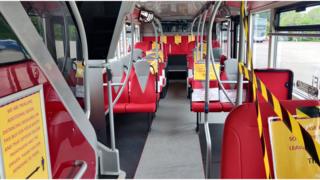 Image copyright
First West of England
Image copyright
First West of England
Bus operators across the UK face an uphill struggle to restore services for workers returning after lockdown.
Unions are also concerned about safety amid reports of higher death rates linked to Covid-19 among male drivers.
The need for social distancing will mean fewer passengers in each bus and the government is encouraging people to avoid public transport if they can.
But fares will not cover costs of restored services, bosses say. The government says it will work with them.
Transport Salaried Staffs' Association (TSSA) union general secretary Manuel Cortes said Prime Minister Boris Johnson's announcement on Sunday to "actively encourage" people to return to work, but discouraging the use of public transport had caused "chaos and panic".
"Frankly, it's dangerous and will put the lives of bus drivers, and all public transport workers, at risk," he said.
"If it gets crowded and dangerous we want bus and rail station closures and if that doesn't happen we'll be telling our members to move out of harm's way and into a safe place which will lead to station closures."
The Confederation of Passenger Transport UK (CPT) said it was running about 40% of its services for about 10% of the passengers it would expect at this time of year.
Bus use change
Percentage (%) of normal levels
Social distancing would differ depending on the layout of buses, but might typically involve passengers only sitting in window seats with a row's gap between them, CPT said.
In that scenario, "farebox revenue would not be enough to cover our costs", the CPT said, and it would "need some form of investment from central government to make that work".
Transport for London (TfL) said the requirement to keep 2m social distancing wherever possible meant the bus network would only be able to carry around 13-15% of the normal number of passengers even when all services were operating again.
Its advice to passengers who cannot avoid using public transport is to travel outside of peak times, wear a face "covering", carry a hand sanitiser and wash hands before and after travel.
Mike Brown, London's transport commissioner, said: "Our intention is to progressively build up service levels to as close to pre-pandemic levels as possible, but it is clear life simply won't be swiftly returning to what it was before.
"The travel demand challenge facing us outstrips that faced during the 2012 games due to the national requirement to maintain 2m distance between passengers wherever possible."
Bristol bus operator First West of England is running two buses in tandem on some peak routes to boost seat numbers while social distancing is in place.
Boss James Freeman told the Local Democracy Reporting Service there could be four in a row as demand increased.
He said: "We've tried to reorganise the business to face the challenge of how we protect people from coronavirus at the same time as providing a minimum level of service for the people who need to travel.
"They are essential workers who haven't got any other form of transport. There aren't that many - patronage is down to about 8%."
He said First had changed schedules according to key workers' feedback, in partnership with the West of England Combined Authority and North Somerset Council.
"Buses are still running from first thing in the morning to late at night," he said.
"Most are completely empty. It's turned our world upside down."
It is trialling signs to advise passengers on where to sit and will be taping off some areas - steps that limit the number of passengers buses can carry.
Mr Freeman said: "There are 20 seats on a double decker. That should reassure people there won't be someone sitting behind them, breathing down their neck.
"With the number of the passengers dropping, they have taken a large chunk of revenue. Most costs are being met from the public purse.
"When the lockdown is relaxed we're expecting to be asked to put on as much as 80% of the service back on. It can only be done if central government is willing to pay."
Reporting team: BBC Shared Data Unit, Local Democracy Reporting Service. Charts by Daniel Wainwright